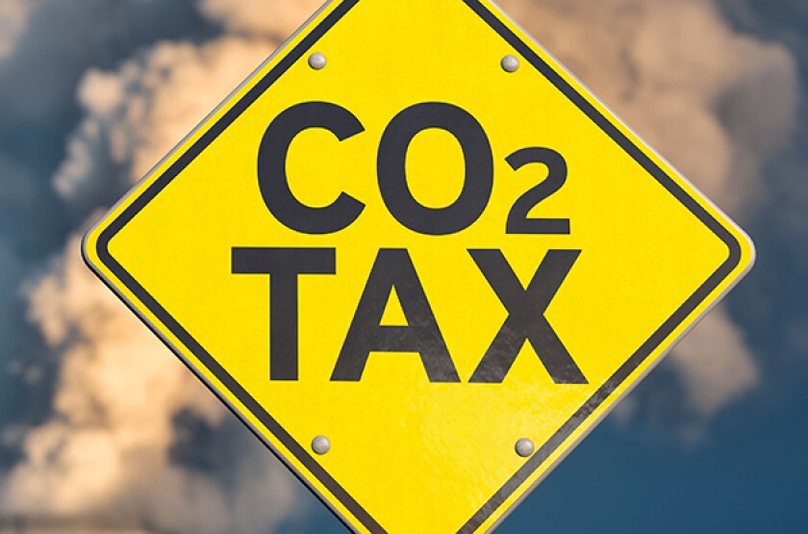Immediate impact will be on products exported to the EU: RMIT expert
The EU’s Carbon Border Adjustment Mechanism (CBAM) applies to six industries: iron and steel, cement, fertilisers, aluminium, electricity, and hydrogen, of which the first four are industries that Vietnam has the capacity to export in, writes Phan Minh Hoa, RMIT associate lecturer of economics.

Vietnam's exporters need to raise their awareness of the carbon tax requirements and impacts on their industries. Photo courtesy of International Tax Review.
Carbon tax on imported goods is a new policy tool first implemented by the European Union (EU). Under the CBAM, the EU will levy a carbon tax on imports based on the intensity of greenhouse gas emissions during production in the exporting country. The CBAM came into force on October 1, 2023 with a transitional phase, and will take full effect from January 2026.
Besides the EU, the UK government has also announced plans to officially implement a UK CBAM by 2027. The U.S. has been considering a carbon tax on imported goods for the past decade, and discussions have heated up again in response to the developments in the EU. Japan also plans to introduce a carbon levy on fossil fuel importers such as energy companies, oil refineries, and steel manufacturers starting from the 2028-2029 fiscal year.
Carbon border tax as a policy tool will attract more support in developed countries where environmental standards are more stringent. It will help their producers compete with exporters from developing countries where looser environmental standards apply. In international trade, this border tax will increase the prices of imported goods and impact supply chains.
How Vietnamese businesses can respond to carbon tax
Exporters need to raise their awareness of the carbon tax requirements and impacts on their industries, while also considering the costs of compliance.
For Vietnam, the immediate impact will be on products exported to the EU. Currently, the EU CBAM applies to six industries: iron and steel, cement, fertilisers, aluminium, electricity, and hydrogen, of which the first four are industries that Vietnam has the capacity to export in. Businesses not currently subject to a CBAM, but are at high risk will need to monitor relevant policy updates published by the EU as well as other countries.
It is necessary to plan for an early response, review existing supply chains, and convert to green production, for instance by using solar energy and wind energy (which Vietnam has a lot of untapped potential for). Businesses should also strictly control their emissions and develop emissions reports, prepare adequate data and share information with the government to develop Vietnam's national emissions data system and get ready for any greenhouse gas reporting requirements.
In addition, exporters need to cooperate with importers, suppliers and the government. No business is an island when it comes to transforming production. When companies work together to reduce emissions and strive for a carbon neutral future, they will gain more competitive advantages and new opportunities.
Companies should also actively share their views with the government to develop policies, such as in carbon pricing and renewable energy promotion, and participate in capacity building training programs.

Phan Minh Hoa, RMIT associate lecturer of economics. Photo courtesy of RMIT.
Support needed from policies
As we dig deeper into the realm of government policies, there are two approaches to carbon tax. The first way is to protest and join other countries (especially developing countries) in pressuring the EU into negotiations to find solutions that are more beneficial to us. Many of the EU's major partners, such as China, Russia, South Africa, India, Brazil and some developing countries, have voiced concerns that environmental policies could become trade barriers that go against the World Trade Organization principles. However, this involves complex processes. It also depends on many factors and affects the prospects of trade relations.
The second approach, which is better for the long term, is to accept and find ways to minimize the negative impacts. While navigating foreign affairs, Vietnam should actively participate in dialogues with partners such as the EU to negotiate for possible exemptions and preferential treatment for developing countries, and leverage technical support from developed countries to adapt to the new rules. Vietnam also needs to strengthen cooperation with other exporting countries to strengthen its position in negotiations.
In terms of domestic policies, Vietnam has levied an excise tax, an environmental protection tax and environmental protection fees for mining since 2011. We need to update these policies, build and promulgate a carbon tax, and develop the domestic carbon credit market so that businesses can trade and create a source of revenue to encourage businesses to “produce green”.
The government needs to provide incentives for businesses to make new investments in research and development of innovative eco-friendly technologies, while encouraging investments in renewable energy and fuel efficiency. Carbon tax revenues need to be properly allocated to fund the environmental protection efforts of businesses and society.
To help businesses raise their awareness, the government can build a centralized unit to coordinate between ministries and agencies, provide specific information to guide businesses in complying with new regulations, and offer training to advance business capacity and social awareness of carbon tax.
Despite the short-term challenges, a carbon tax on imported goods will create a stronger impetus for Vietnamese businesses and policymakers to innovate and meet Vietnam's net zero emissions goal by 2050.
- Read More
Germany looks to Vietnam's largest tungsten mine for critical mineral supply diversification
Germany is turning its attention to Vietnam’s Nui Phao mine, one of the world’s largest tungsten deposits outside China, as part of efforts to diversify supplies of strategic minerals.
Industries - Thu, November 20, 2025 | 5:27 pm GMT+7
Vietnam's tech firms should pursue end-to-end product strategy, avoid ‘halfway’ innovation: minister
Vietnamese technology firm ought to pursue a product-driven strategy and sustain long-term global ambitions, said Minister of Science and Technology Nguyen Manh Hung.
Economy - Thu, November 20, 2025 | 5:23 pm GMT+7
Vietnam’s gaming market needs more than just a 'pho restaurant'
To keep up with the booming gaming industry, Vietnamese developers must innovate by embracing stronger technology adoption while still forging a unique identity, and sometimes, that unique identity could simply be represented by a humble bowl of pho (noodle soup).
Economy - Thu, November 20, 2025 | 4:14 pm GMT+7
F88 named among Best Managed Companies 2025 by Deloitte
Vietnam’s consumer finance major F88 has been recognized by Deloitte as one of the “Vietnam Best Managed Companies 2025”, meeting international governance standards.
Companies - Thu, November 20, 2025 | 2:47 pm GMT+7
PTC1 unit assesses information security at 220kV northern Vietnam substations
The Northeast Power Transmission Team 3, a unit of Power Transmission Company No.1 (PTC1), coordinated with Cyberspace Operations Command (Command 86) to conduct an information security (IS) assessment at the 220kV Lang Son and Bac Quang substations from November 10-14.
Companies - Thu, November 20, 2025 | 1:12 pm GMT+7
Vietnam’s largest listed firm to double charter capital
Vingroup, the biggest company by market capitalization on Vietnam's bourses, said it will double its charter capital to more than VND77 trillion ($2.92 billion) after issuing nearly 3.9 billion bonus shares to existing shareholders at a 1:1 ratio.
Companies - Thu, November 20, 2025 | 11:50 am GMT+7
Consortium plans $12.8 bln boulevard-landscape project in Hanoi
A consortium including Vietnam’s transport infrastructure giant Deo Ca Group has proposed developing the VND338 trillion ($12.81 billion) Red River boulevard and landscape, which could become Hanoi’s largest-ever infrastructure project.
Infrastructure - Thu, November 20, 2025 | 8:58 am GMT+7
Viettel, UAE-based EDGE partner on defense, dual-use technologies
Military-run Viettel, Vietnam’s largest telecommunications and technology group, has signed an MoU with EDGE, one of the world’s leading advanced technology and defence companies, in a move that underscores the country’s ambition to expand high-tech manufacturing.
Companies - Thu, November 20, 2025 | 8:53 am GMT+7
Maersk eyes building major container ports in Vietnam
A.P.Moller - Maersk (Maersk) is exploring investment opportunities to develop large, modern and low-carbon container ports in Vietnam.
Infrastructure - Wed, November 19, 2025 | 4:36 pm GMT+7
Taiwan semiconductor giant Panjit acquires 95% of Japan-based Torex’s Vietnam arm
Panjit International Inc, a Taiwan-listed semiconductor major, has approved the acquisition of a 95% stake in Torex Vietnam Semiconductor, a subsidiary of Japan-based Torex.
Companies - Wed, November 19, 2025 | 3:59 pm GMT+7
Vietnam PM urges Kuwait Petroleum to expand Nghi Son refinery, build bonded fuel storage facility
Prime Minister Pham Minh Chinh on Tuesday called on Kuwait Petroleum Corporation (KPC) to expand the Nghi Son oil refinery and build a bonded fuel storage facility in Vietnam.
Industries - Wed, November 19, 2025 | 3:18 pm GMT+7
Southern Vietnam port establishes strategic partnership with Japan’s Port of Kobe
Long An International Port in Vietnam’s southern province of Tay Ninh and Japan’s Port of Kobe on Monday signed an MoU establishing a strategic port partnership which is expected to boost trade flows, cut logistics costs, and deliver greater benefits to businesses across the region.
Companies - Wed, November 19, 2025 | 10:14 am GMT+7
Thaco's agri arm seeks to expand $44 mln cattle project in central Vietnam
Truong Hai Agriculture JSC (Thaco Agri), the agriculture arm of conglomerate Thaco, looks to aggressively expand its flagship cattle farming project in the central Vietnam province of Gia Lai.
Industries - Wed, November 19, 2025 | 9:56 am GMT+7
Japan food major Acecook eyes new plant in southern Vietnam
Acecook, a leading instant noodle maker with 13 plants operating in Vietnam, is studying a new project in the southern province of Tay Ninh.
Industries - Wed, November 19, 2025 | 9:39 am GMT+7
Vietnam’s largest Aeon Mall to take shape in Dong Nai province
Authorities of Dong Nai province, a manufacturing hub in southern Vietnam, on Monday awarded an investment registration certificate to Japanese-invested Aeon Mall Vietnam Co., Ltd. for its Aeon Mall Bien Hoa project.
Industries - Tue, November 18, 2025 | 8:17 pm GMT+7
Police propose prosecuting Egroup CEO Nguyen Ngoc Thuy for fraud, bribery
Vietnam’s Ministry of Public Security has proposed prosecuting Nguyen Ngoc Thuy, chairman and CEO of Hanoi-based education group Egroup, along with 28 others, for fraud to appropriate property, giving bribes, and receiving bribes.
Society - Tue, November 18, 2025 | 4:01 pm GMT+7


























